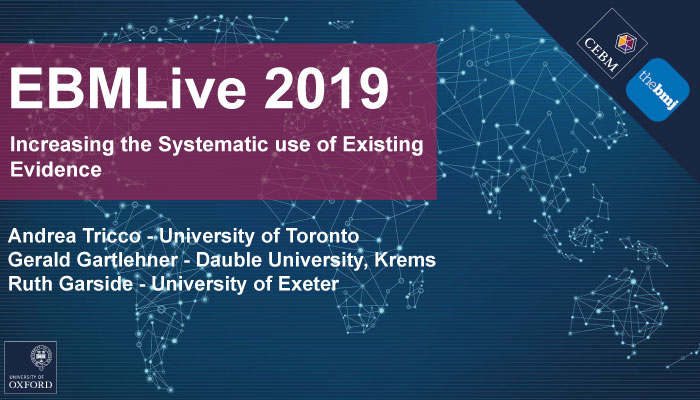
Speaker/s:
Andrea Tricco – St Michael’s Hospital and University of Toronto



Andrea Tricco – St Michael’s Hospital and University of Toronto
Andrea Tricco – Advancing the science of knowledge synthesis to increase the uptake of evidence
Knowledge users (such as patients, healthcare providers, policy-makers) require relevant, timely and high quality information for their decision-making needs. Advancing the science of different forms of knowledge synthesis – for example, rapid reviews, scoping reviews, and network meta-analysis – allows researchers to provide knowledge users with different types of evidence more rapidly without compromising results, which may be more suitable to their needs. This may also result in increased uptake of results and reduced research waste.
Gerald Gartlehner – Does the pill against love sickness work? Responding to inquiries of the general public with existing evidence.
Evidence syntheses have become valuable tools to support decisions of patients, doctors, and health policy decision-makers. Average citizens, however, though continually addressed by health claims through the popular and social media, are usually not the target group of initiatives to support evidence-informed decisions. Sometimes the health claims are true, sometimes they are disingenuous, and frequently they are misinterpretations of legitimate studies.
This talk presents a project that started out as a media watchdog and evolved into a service for Austrian citizens who have questions or concerns about health claims in the media. The initiative combines evidence-based approaches used in medicine with quality journalism to support the day-to-day health decisions of the general public. In plain language, it provides citizens access to existing evidence that is usually out of reach for people without a medical background.
Ruth Garside – Beyond Barriers and Facilitators: using Qualitative Evidence Synthesis to develop understandings from qualitative research
Systematic reviews of quantitative research are well established as a mechanism for synthesising the results of effectiveness studies to enhance their usefulness and reliability for decision-makers. While the role of Qualitative Evidence Synthesis is increasing, these are often limited by the way questions are framed. This presentation will discuss the kinds relevant questions that qualitative research addresses, how Qualitative Evidence Synthesis can bring their findings together to further understandings, and emerging approaches to assess how confident decision-makers can be in the resultant synthesised findings